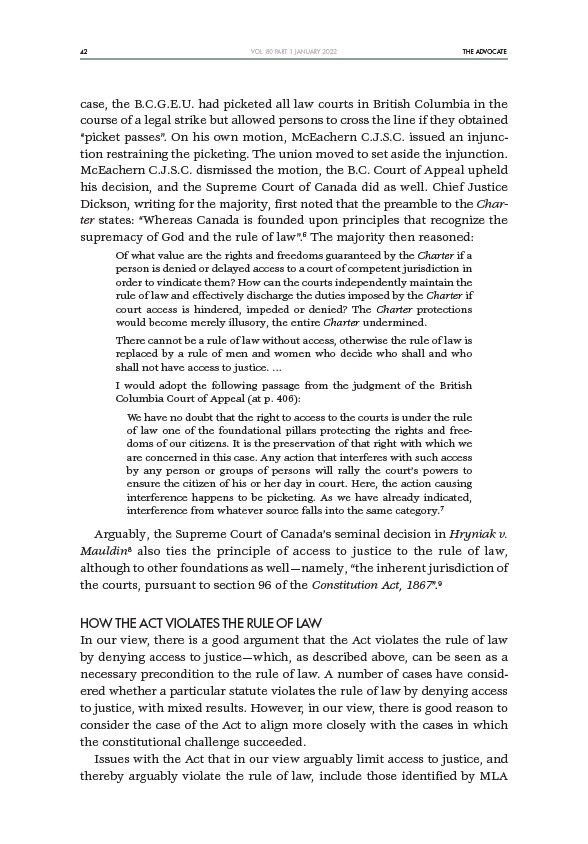
42 THE ADVOCATE
VOL. 80 PART 1 JANUARY 2022
case, the B.C.G.E.U. had picketed all law courts in British Columbia in the
course of a legal strike but allowed persons to cross the line if they obtained
“picket passes”. On his own motion, McEachern C.J.S.C. issued an injunction
restraining the picketing. The union moved to set aside the injunction.
McEachern C.J.S.C. dismissed the motion, the B.C. Court of Appeal upheld
his decision, and the Supreme Court of Canada did as well. Chief Justice
Dickson, writing for the majority, first noted that the preamble to the Charter
states: “Whereas Canada is founded upon principles that recognize the
supremacy of God and the rule of law”.6 The majority then reasoned:
Of what value are the rights and freedoms guaranteed by the Charter if a
person is denied or delayed access to a court of competent jurisdiction in
order to vindicate them? How can the courts independently maintain the
rule of law and effectively discharge the duties imposed by the Charter if
court access is hindered, impeded or denied? The Charter protections
would become merely illusory, the entire Charter undermined.
There cannot be a rule of law without access, otherwise the rule of law is
replaced by a rule of men and women who decide who shall and who
shall not have access to justice. …
I would adopt the following passage from the judgment of the British
Columbia Court of Appeal (at p. 406):
We have no doubt that the right to access to the courts is under the rule
of law one of the foundational pillars protecting the rights and freedoms
of our citizens. It is the preservation of that right with which we
are concerned in this case. Any action that interferes with such access
by any person or groups of persons will rally the court’s powers to
ensure the citizen of his or her day in court. Here, the action causing
interference happens to be picketing. As we have already indicated,
interference from whatever source falls into the same category.7
Arguably, the Supreme Court of Canada’s seminal decision in Hryniak v.
Mauldin8 also ties the principle of access to justice to the rule of law,
although to other foundations as well—namely, “the inherent jurisdiction of
the courts, pursuant to section 96 of the Constitution Act, 1867”.9
HOW THE ACT VIOLATES THE RULE OF LAW
In our view, there is a good argument that the Act violates the rule of law
by denying access to justice—which, as described above, can be seen as a
necessary precondition to the rule of law. A number of cases have considered
whether a particular statute violates the rule of law by denying access
to justice, with mixed results. However, in our view, there is good reason to
consider the case of the Act to align more closely with the cases in which
the constitutional challenge succeeded.
Issues with the Act that in our view arguably limit access to justice, and
thereby arguably violate the rule of law, include those identified by MLA